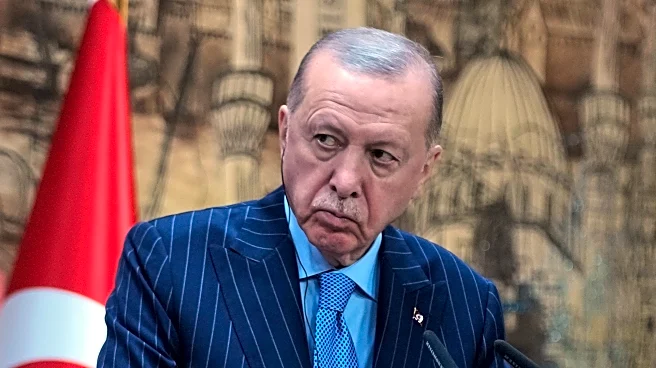What's Happening?
Billionaire businessman Andrej Babis has emerged victorious in the Czech Republic's parliamentary elections, with his populist ANO party securing just under 35% of the vote. This result translates to 80 seats in the 200-seat lower house, an increase from 72 seats four years ago. Despite this success, ANO fell short of an overall majority, necessitating coalition talks. Babis, who served as prime minister from 2017 to 2021, is expected to lead discussions on forming a new government. He has initiated talks with two small right-wing eurosceptic parties, the Motorists for Themselves and the Freedom and Direct Democracy (SPD) party, to form a coalition. However, Babis has expressed a preference for ANO to govern alone rather than create a formal coalition.
Why It's Important?
The election results are significant as they highlight the ongoing influence of populist politics in the Czech Republic. Babis' victory underscores his continued appeal despite controversies surrounding his leadership. The potential coalition with eurosceptic parties could impact the Czech Republic's stance on EU policies, particularly regarding emissions targets and energy policies. The outcome may also affect the country's foreign policy, especially its support for Ukraine amidst the ongoing conflict. The election results could lead to shifts in domestic and international policies, influencing the Czech Republic's role within the EU and its relations with neighboring countries.
What's Next?
Babis will need to navigate complex coalition negotiations to secure a majority in parliament. The potential alliance with the Motorists for Themselves and SPD presents challenges, particularly given SPD's far-right affiliations and differing policy priorities. Babis has ruled out a referendum on EU or NATO membership, a key SPD policy, which could complicate coalition talks. The new government will likely face scrutiny over its approach to EU emissions targets and its stance on Ukrainian refugees. The outcome of these negotiations will shape the Czech Republic's political landscape and its future policy directions.
Beyond the Headlines
The election results reflect broader trends in European politics, where populist and eurosceptic parties are gaining traction. Babis' victory may embolden similar movements across the continent, influencing EU policy debates. The coalition talks could reveal deeper divisions within Czech society regarding immigration and EU integration. The election also highlights the challenges of coalition politics, where differing priorities can lead to unstable governments. The Czech Republic's political future will depend on how these dynamics are managed in the coming months.












